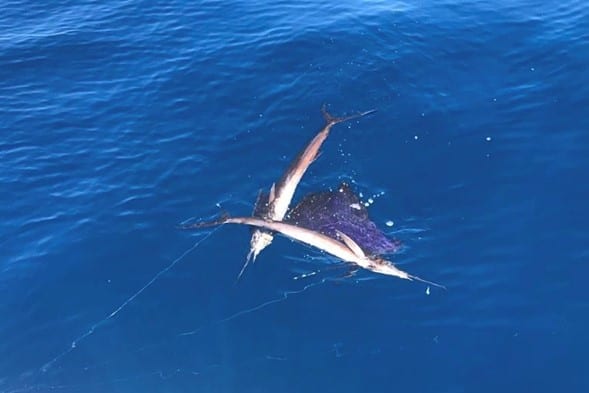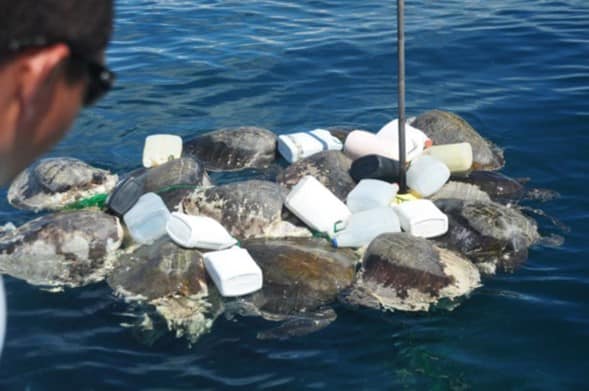The opposition from the Pacific Sport Fishing Association of Costa Rica to Bill 23.643 making it illegal to sell sailfish in Costa Rica continues to baffle me. The comments of their spokesman Daniel Espinoza on a recent Channel 6 news report on the subject were nearly unbelievable.
It is illegal for commercial fisherman to target sailfish, but longline fishermen are currently allowed up to 10% of their catch to be sailfish as incidental catch and be sold on the National market. If encountered alive, all sailfish must be released. The problem is very few are released because for them it is like throwing money back in the ocean.
In the news report Espinoza could be heard saying it is better for the commercial fishermen to carry the fish to shore to sell than let the tourists see floating dead sailfish in the ocean. This would only continue the slaughter of sailfish. The tourists already see plenty of dead and dying sailfish when longliners leave their line unattended in the ocean for extended periods of time while they return inshore looking for live bait.

PHOTO Dead sailfish on commercial longlines increases when lines are left unattended.
Every other excuse or rumor broadcast by the Pacific Sport Fish group across the fishing community was proven to be untrue by the sponsor of the law, congressman Eli Feinzaig or Costa Rican scientists.
The first myth spread by them was if sailfish were declared a national symbol, they would become a no touch species by all sectors. Congressman Feinzaig cleared that rumor up by explaining coffee and Morpho butterflies are National symbols with permit to market them. Then the group complained that there were not sufficient studies to support banning the sale of sailfish even though more than 10,000 charter trips were analyzed as well as more than a decade of commercial landings.
The findings passed peer review with flying colors. Even though the reported landing of sailfish is only 4% of their annual catch, their landings have increased 120 % in the last decade. Sport Fishing “catch and release” has decreased as much as 70% in some parts of the country over the same period.
Another complaint the Pacific Sport Fish group has is that according to Espinoza, they represent 80% of the sport fishing community in Costa Rica and were not properly consulted about the proposed law while FECOP, another NGO supplied the science used to justify the proposed action to save sailfish.
If they did represent 80% of the fishing community, you would think they would update their Facebook and website to keep the fishing sector informed but they have not done so in 7 years. FECOP doesn’t claim to represent any individual. They are a scientific based group that lobbies for the improvement of employment opportunities in the sport fishing community and improved management of marine resources.
A recent FECOP win for Sport Fishing was the tuna reform law moving the tuna purse seine boats out permanently to 80 miles from a temporary 45 miles. FECOP supplied the science and congress was convinced to pass the law unanimously. It was over a two-year process of back and forth with the tuna industry. What I found ironic is the same lawyer defending the Cámara Atunera de Costa Rica (tuna industry) in that battle to move tuna boats offshore, Luis Dobles is now representing the Pacific Sport group.
He has also defended the shrimp trawling industry and was involved in shark finning incidents. Which brings up questions about what is really going on. Every statement coming from the Pacific Sport Fishing groups sounds the same as if it was coming from the longliners themselves. Spokesman Espinoza has failed to recognize there is a sailfish problem or suggest another management plan to recover sailfish populations.
In a recent radio interview, Dobles went as far to suggest there is already regulations in place to manage sailfish. Due to lack of interest and lack of enforcement these regulations will never work. Soon I will explain why these “paper regulations” haven´t worked for the last decade and will never work.
I am sure 80% of the fishing sector does not agree with Espinoza or his group and would love to see the sailfish numbers improve. It is almost like Espinoza has been made a sacrificial lamb by being appointed to be the group’s voice. There are other prominent names in the sport fishing arena that for some reason don’t support banning the sale of sailfish in Costa Rica, but they don’t want their fingerprints anywhere near them saying so publicly. Especially when the reasons for not supporting the law digress to “so tourists won’t see dead sailfish floating in the ocean.”
One last rumor or myth the group has been spreading about FECOP is this. FECOP is not really interested in sport fishing but more of an environmental group. If that were the case, why would FECOP invest all the money and effort in passing the tuna reform law? People have told me that some from your group have claimed you did the tuna reform and FECOP stole the credit. That would have been difficult since your attorney was busy defending the tuna industry.
In the end who gets credit is not important. The fact that there are a ton of tuna out there for sport fishermen today when there was very few is. Every sport fish angler in the country is benefitting from the tuna reform law. Tuna, dorado, and marlin fishing has improved but not sailfish. That is why sailfish need better management.
Why would we invest in doing the technical studies for INCOPESCA to approve the issuing of greenstick licenses? This project met the requirements to issue licenses to commercial longliners to have a more sustainable method to catch tuna and lower bycatch of sailfish. The few who adapted have done quite well but mainly the method has been resisted in favor of the old set your line and wait method.
One last question. If we didn’t support sport fishing why would we invest $50,000 developing and later improving a Free Fishing APP (PEZCA) for Central America helping fishermen make decisions with Satellite data from NASA as to where to fish according to nearly real time data. It also has waypoint logging, and moon and tide phases. Download for free at Apple Store or Google Play.
With Central Pacific Sport Fishing Association’s latest logic on floating sailfish we should all be eating turtle steak and sipping turtle fin soup. A study published in the Journal of Experimental Marine Biology and Ecology suggests that longline fisheries in Costa Rica unintentionally caught about 700,000 Olive Ridley turtles as bycatch between 1999 and 2010—the second highest catch after dorado (mahi-mahi.)
Other bycatch included silky sharks, pelagic stingrays, and Indo-Pacific sailfish. It is estimated 2 to 3% swallow the hook and die and others perish from forcing the $10 hook out of the animal rather than cutting the hook. Autopsies on a massive turtle kill in Southern Costa Rica showed the cause of death was longlines.

To their credit longliners claim they have been given training on releasing marine turtles. Many have also learned if one opens the carcass, the body sinks and will not float for tourists to see.
FECOP has 5 councils around the country in the major fishing zones that make suggestions and present projects for FECOP to consider helping implicate or help funding. Yokselin Lopez and Andres Bonilla submitted a project to create a better standard of service within sportfishing and thought women could do this but being a mate on a boat is not a job that women typically do.
With Henry Marin as project manager and INA, they train local women for that work. Guanacaste is on its second group and 40 women showed up in Quepos to register for the course when it moves to Marina Pez Vela.
One of the graduates in Guanacaste, a single mother with two children was working on a sport fishing boat but was fired recently, after someone supporting the Pacific group called her boss. Her boss covered his bases by officially letting her go for “reorganization of personnel,” but her boss also made sure he told her he let her go because of her support of FECOP. That should make the Central Pacific group in Herradura and especially the women in your group proud to be part of this young lady losing her job in your quest for vengeance against FECOP.
Sometimes father time races by or events happen in life that make one realize one they are closer to the end than to the middle. That is when many take a personal inventory and think about what we are going to leave in this world as our legacy. Seems like only yesterday Greg Allman’s “I’m no Angel” was my anthem.
Recently I was asked what I wanted my legacy to be. I thought for a moment and then replied. “I really don’t care what people think or say about me except for my grandkids. To them I want to be remembered as the old white bearded fisherman who loved the ocean. He tried to teach people to respect the ocean and with proper management the ocean can survive and thrive.”
For them I want my legacy to be the way I worked towards saving the ocean. I don’t want them to say I was part of the group that gave it away. If your grandkids knew your complete story, would they say the same?





